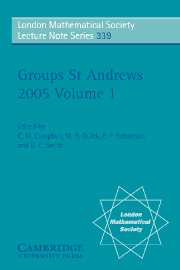Book contents
- Frontmatter
- Contents
- Introduction
- Aspects of infinite permutation groups
- Self-similarity and branching in group theory
- On surface groups: motivating examples in combinatorial group theory
- Nilpotent p-algebras and factorized p-groups
- Classification of finite groups by the number of element centralizers
- Algorithmic use of the Mal'cev correspondence
- Minimal but inefficient presentations for semi-direct products of finite cyclic monoids
- The modular isomorphism problem for finite p-groups with a cyclic subgroup of index p2
- On one-generated formations
- New results on products of finite groups
- Radical locally finite T-groups
- Explicit tilting complexes for the Broué conjecture on 3-blocks
- Conjugacy classes of p-regular elements in p-solvable groups
- An algorithm for the unit group of the Burnside ring of a finite group
- Integral group ring of the first Mathieu simple group
- Embedding properties in direct products
- Malcev presentations for subsemigroups of groups — a survey
- Finite groups with extremal conditions on sizes of conjugacy classes and on degrees of irreducible characters
- Conjugacy class structure in simple algebraic groups
- On automorphisms of products of groups
- Linear groups with infinite central dimension
- G-automata, counter languages and the Chomsky hierarchy
- An embedding theorem for groups universally equivalent to free nilpotent groups
- Irreducible word problems in groups
- Recent growth results
Finite groups with extremal conditions on sizes of conjugacy classes and on degrees of irreducible characters
Published online by Cambridge University Press: 07 May 2010
- Frontmatter
- Contents
- Introduction
- Aspects of infinite permutation groups
- Self-similarity and branching in group theory
- On surface groups: motivating examples in combinatorial group theory
- Nilpotent p-algebras and factorized p-groups
- Classification of finite groups by the number of element centralizers
- Algorithmic use of the Mal'cev correspondence
- Minimal but inefficient presentations for semi-direct products of finite cyclic monoids
- The modular isomorphism problem for finite p-groups with a cyclic subgroup of index p2
- On one-generated formations
- New results on products of finite groups
- Radical locally finite T-groups
- Explicit tilting complexes for the Broué conjecture on 3-blocks
- Conjugacy classes of p-regular elements in p-solvable groups
- An algorithm for the unit group of the Burnside ring of a finite group
- Integral group ring of the first Mathieu simple group
- Embedding properties in direct products
- Malcev presentations for subsemigroups of groups — a survey
- Finite groups with extremal conditions on sizes of conjugacy classes and on degrees of irreducible characters
- Conjugacy class structure in simple algebraic groups
- On automorphisms of products of groups
- Linear groups with infinite central dimension
- G-automata, counter languages and the Chomsky hierarchy
- An embedding theorem for groups universally equivalent to free nilpotent groups
- Irreducible word problems in groups
- Recent growth results
Summary
Introduction
In this survey G denotes a finite group of order g, with k conjugacy classes and center Z(G) of order z. Denote the order of G', the commutator subgroup of G, by g' and assume that g > 1. Denote by Cls(G) = {c1 = 1, c2,…,ck} the multiset composed of the sizes of the conjugacy classes of G (with c1 = |{1}|) and by Chd(G) = {x1 = 1, x2,…, xk} the multiset composed of the degrees of the irreducible characters of G (with x1 = 1G(1)). The influence of the arithmetical structure of the ci's and the xi's on the group-theoretical structure of G has been investigated in many papers. For example, the following results concerning the class sizes in G were proved in [4]. Here, and in the sequel, by “a class” we mean “a conjugacy class” and by “a prime” we mean “a non-necessarily fixed prime”. For additional information, see [4], [5], [6] and [8].
Theorem 1The following statements hold:
If ci equals 1 or a prime for each ci ∈ Cls(G), then either G is nilpotent of class ≤ 2 or G/Z(G) is a Frobenius group of order pq, where p and q are distinct primes.
If ci equals 1 or a prime power for each ci ∈ Cls(G), then either G is nilpotent or G/Z(G) is a solvable Frobenius group.
[…]
- Type
- Chapter
- Information
- Groups St Andrews 2005 , pp. 269 - 273Publisher: Cambridge University PressPrint publication year: 2007

